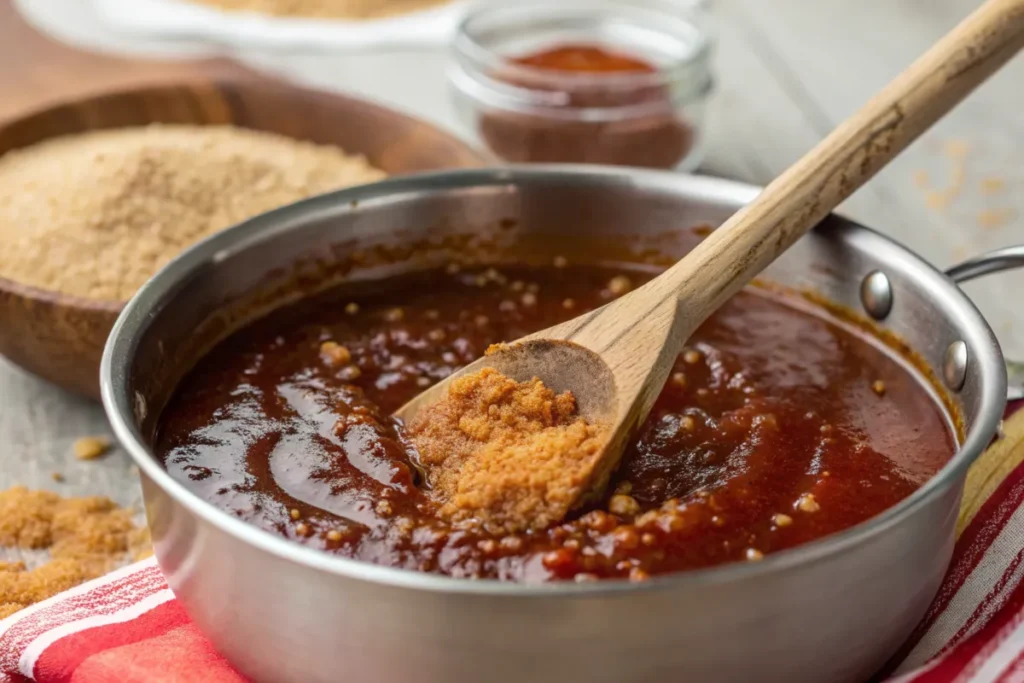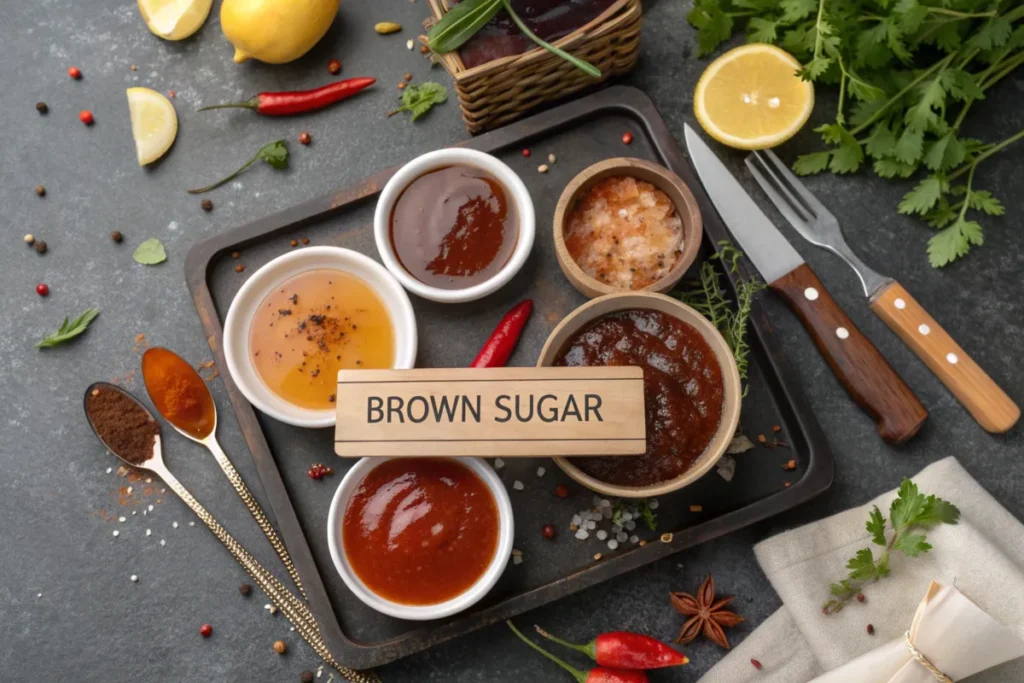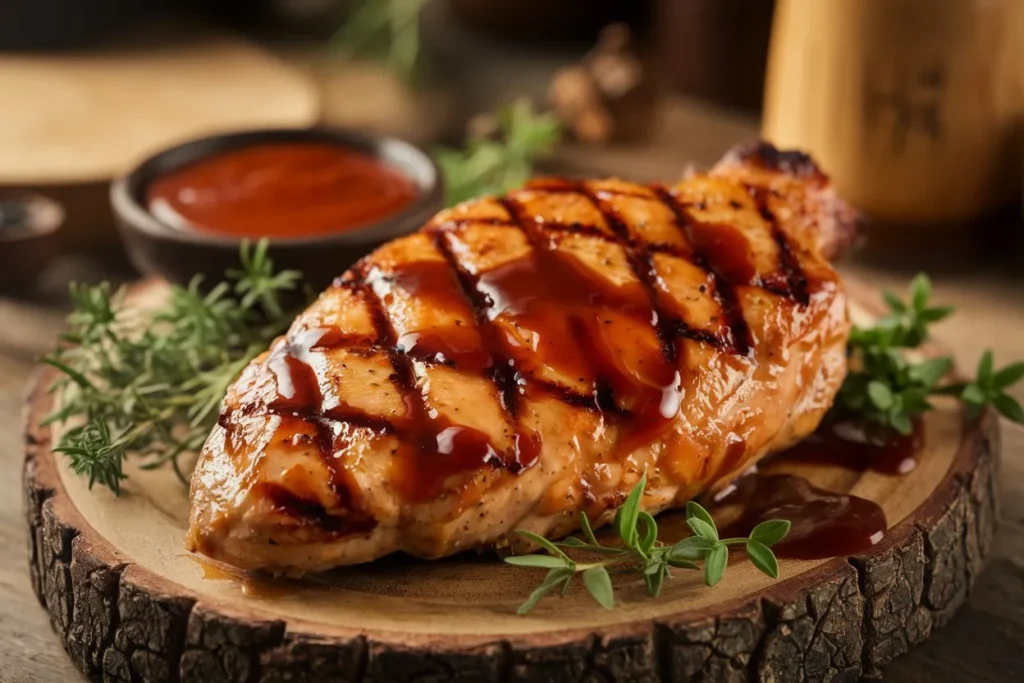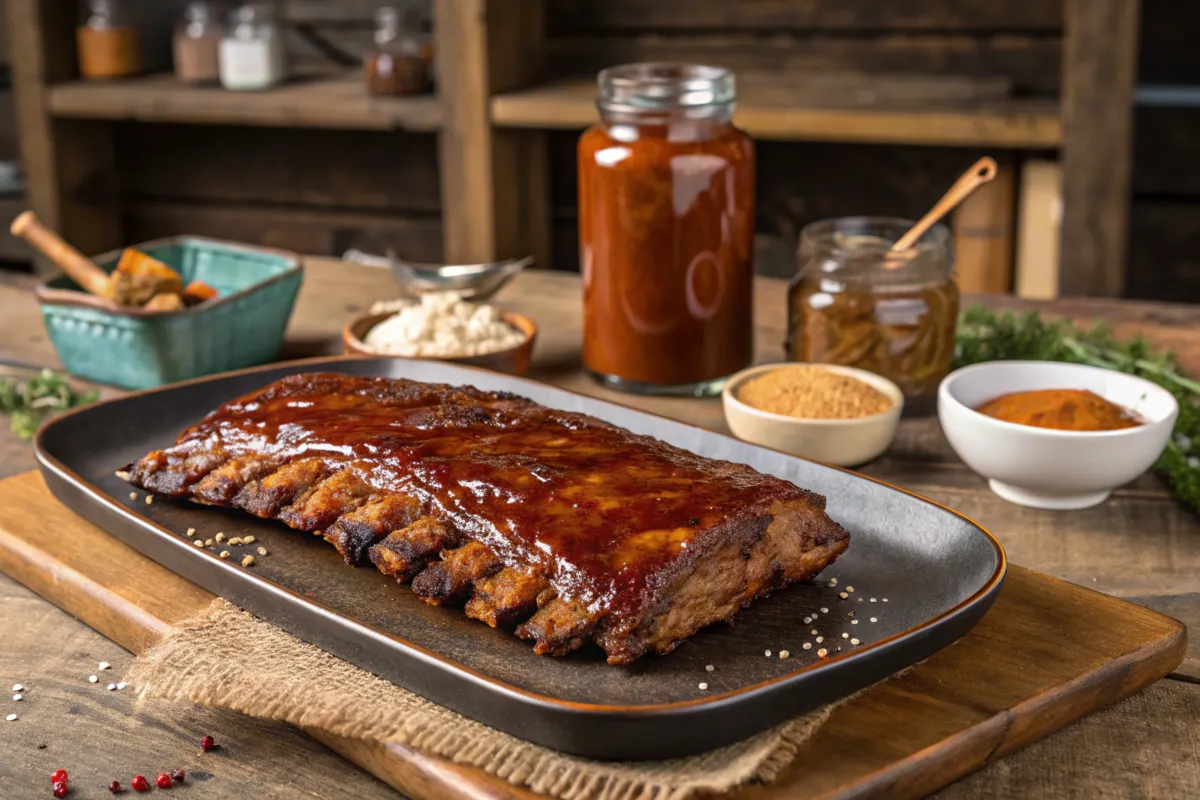What Does Adding Brown Sugar to BBQ Sauce Do?
Barbecue sauce brings smoky, tangy, and savory flavors to grilled and smoked meats, but the right sweetness can turn a good sauce into an irresistible one. One of the most popular sweeteners for barbecue sauce is brown sugar. But what exactly does adding it do? This article explores how brown sugar affects taste, texture, and overall balance. We’ll cover types of brown sugar, alternatives, and techniques to enhance your BBQ sauce for next-level flavor.
Introduction to Brown Sugar in BBQ Sauce
Why Sugar Is an Essential Component in BBQ Sauce
Barbecue sauce is all about balance—bringing together sweet, tangy, and savory elements in perfect harmony. The sweetness plays a pivotal role, cutting through the acidity of vinegar or tomatoes while mellowing the heat from chili peppers or spices. Brown sugar, thanks to its rich molasses content, offers more depth compared to white sugar or corn syrup.
Importance of Flavor Balance in Barbecue Sauce
A well-crafted BBQ sauce isn’t just sweet—it’s a symphony of flavors. The sweetness from brown sugar adds a caramel-like note, which complements the smoky and spicy elements typical of grilled meats. Using brown sugar properly creates a smoother, more rounded flavor profile that enhances the meat’s natural richness rather than overpowering it. As we delve deeper, you’ll discover how to unlock its full potential to make your barbecue unforgettable. you decide when to apply barbecue sauce to achieve that perfect blend of flavor and texture.
The Role of Sweetness in BBQ Sauce
Enhancing the Flavor Profile
Sweetness plays a vital role in creating a rich, balanced barbecue sauce. It tempers acidity from ingredients like tomato paste or vinegar, softens heat from spices, and enhances the natural umami of grilled meats. Adding brown sugar to BBQ sauce introduces a mellow, deep sweetness that plain white sugar can’t replicate. The molasses content in brown sugar adds subtle hints of caramel and toffee, boosting the sauce’s complexity and giving it a more layered taste.
When done right, the sweetness doesn’t overpower but complements the smoky and savory elements. Whether you’re crafting a Memphis-style or Kansas City BBQ sauce, sweetness brings everything together. Using brown sugar helps maintain that harmony while adding a distinct richness that makes your sauce unforgettable.
Balancing Acidity and Spiciness
Acidic notes from vinegar or citrus give barbecue sauce its tang, while chili peppers and spices add heat. Brown sugar’s sweetness balances these contrasting flavors, creating a smoother sauce that appeals to broader tastes. This balance is especially crucial when dealing with spicy recipes. The deep, molasses-rich flavor of brown sugar mellows sharp, tangy notes and provides a luxurious finish. By learning how brown sugar influences flavor, you can craft sauces tailored to your preferred balance of sweet and spicy.

What Brown Sugar Adds to BBQ Sauce
Caramel-Like Sweetness: Impact on Taste
One of the defining features of brown sugar in barbecue sauce is its ability to create a caramelized flavor. When heated, the sugar molecules break down and form rich, nutty undertones. This caramelization enhances the smoky notes from grilling, giving your sauce more depth. Unlike white sugar, brown sugar’s molasses provides an earthy complexity that makes each bite feel more indulgent.
Rich Molasses Undertones: Differentiating from White Sugar
What does adding brown sugar to BBQ sauce do that white sugar can’t? It’s all about the molasses. Light brown sugar contains around 3.5% molasses, while dark brown sugar has nearly twice as much. This difference results in a more robust flavor profile. Dark brown sugar brings boldness, perfect for hearty meats like ribs or brisket, while light brown sugar works well for sweeter, fruit-based sauces.
Flavor Depth: How Brown Sugar Complements Other Spices
Spices like smoked paprika, cumin, and mustard thrive in the company of brown sugar. The molasses binds flavors together, creating a unified profile. Think of brown sugar as a bridge—tying together tangy, spicy, and smoky notes in a sauce that’s smooth and cohesive. This binding effect not only intensifies flavor but also leaves a lingering, mouthwatering sweetness that makes your barbecue sauce unforgettable.
Influence on Sauce Texture and Consistency
How Brown Sugar Thickens BBQ Sauce
When wondering what does adding brown sugar to BBQ sauce do, texture is a key benefit. Brown sugar not only enhances flavor but also contributes to the sauce’s body. As the sugar dissolves, it thickens the mixture, creating a luscious, smooth consistency perfect for coating ribs, chicken, or pulled pork. The molasses in brown sugar further intensifies this thickening effect, making it ideal for slow-cooked and sticky-sweet sauces.
Reduction Effect: A Smoother, Thicker Texture
Cooking BBQ sauce down with brown sugar intensifies flavors and reduces water content. This process creates a thicker, richer base that clings beautifully to meats. Unlike thin, runny sauces, a reduction that includes brown sugar delivers a velvety texture that enhances both presentation and taste.
Moisture Retention Properties
Molasses-rich brown sugar also helps retain moisture. This is why many pitmasters use it not only in sauces but also in rubs and marinades. The sugar draws in water molecules, preventing the sauce from drying out during grilling or baking, keeping meats juicy and succulent.heck out Instant Pot Buffalo Chicken for a saucy alternative.

Types of Brown Sugar and Their Impact
Light vs. Dark Brown Sugar: Taste Differences
The choice between light and dark brown sugar depends on your flavor preferences. Light brown sugar has a milder sweetness with subtler molasses tones, ideal for delicate sauces or those featuring fruity or tangy ingredients. Dark brown sugar, on the other hand, provides a bold, deep flavor perfect for smoky, robust BBQ sauces like those used on brisket or ribs.
Choosing the Right Type for Specific BBQ Styles
Different BBQ regions favor unique profiles. Memphis-style sauces lean sweet, making light brown sugar a fitting choice. Kansas City barbecue embraces richer, darker sauces, where dark brown sugar’s more intense molasses notes shine. By tailoring sugar type to your recipe, you achieve a custom balance of sweetness and complexity that perfectly complements your barbecue style. Chicken, a recipe that highlights seasoning and sauce layering techniques beautifully.
Techniques for Adding Brown Sugar to BBQ Sauce
Proper Timing for Adding Sugar
When considering what does adding brown sugar to BBQ sauce do, timing plays a critical role in getting the best results. Adding brown sugar too early can lead to burning, especially during high-heat cooking. Instead, it’s best to mix the sugar into the sauce as it simmers. This allows it to dissolve slowly, infusing the sauce with rich sweetness while avoiding bitter caramelization. For grilling, applying a brown sugar-laden sauce near the end of cooking helps prevent scorching while still giving you that sticky, caramelized coating.
To achieve a balanced, thick consistency, stir the sauce frequently as the sugar dissolves. If making large batches, consider dissolving the brown sugar in a bit of warm liquid (like apple juice or vinegar) before adding it to prevent clumping.
Common Mistakes and How to Avoid Them
One common mistake is using too much brown sugar, resulting in an overly sweet sauce that masks other flavors. Start with small amounts and taste frequently to find the right balance. Another pitfall is neglecting to whisk the sauce continuously, which can cause uneven texture or burned spots. Finally, avoid adding sugar directly to boiling liquids—this can cause rapid caramelization, changing the flavor and texture in unintended ways.
How Do You Get BBQ Sauce to Stick to Chicken in the Oven?
To ensure barbecue sauce sticks well to the chicken, start by patting the chicken dry before applying the sauce. A light seasoning or thin coating of oil can also help the sauce adhere during cooking. If you’re layering sauce, let each coat set for a few minutes in the oven before adding more.
Is It Best to Cook Chicken Before BBQ?
VVPre-cooking chicken before grilling or baking with barbecue sauce can help avoid undercooking. Parboiling or baking the chicken until almost done ensures even cooking, allowing you to focus on caramelizing the sauce without worrying about raw spots.

Substitutes for Brown Sugar in BBQ Sauce
Alternatives Like Molasses, Honey, or Maple Syrup
If you don’t have brown sugar on hand, there are several worthy substitutes that still offer complex sweetness. Molasses, a component of brown sugar, provides a deep, smoky flavor when used alone. Honey offers floral notes and helps thicken the sauce, while maple syrup brings a unique, woodsy sweetness perfect for rustic BBQ recipes. Each alternative adds its own twist, but none fully replicate what brown sugar does in BBQ sauce: delivering caramelized depth with a hint of molasses richness.
Comparing Sweetness and Flavor Impact
When substituting, consider sweetness levels. Honey and maple syrup are sweeter than brown sugar, so adjust the quantity to avoid overpowering the sauce. If using molasses alone, its bold flavor can dominate, so use it sparingly. Creating a blend of substitutes, like honey mixed with a touch of molasses, often yields a closer approximation to brown sugar’s nuanced effect on taste and texture.
In each case, the goal remains balance—combining sweetness with tang and spice to create a harmonious BBQ experience.
Common Questions About Sugar in BBQ Sauce
What Does Brown Sugar Do in BBQ Sauce?
The question “What does adding brown sugar to BBQ sauce do?” often comes up among barbecue enthusiasts. The simple answer is that brown sugar adds both flavor and texture. It brings a deep, molasses-like sweetness that balances tangy vinegar and spicy peppers. As it cooks, brown sugar caramelizes, creating a rich, glossy glaze that enhances the look and taste of grilled or smoked meats. Without this key ingredient, many sauces would lack the smooth, sweet finish that makes barbecue irresistible.
Does Brown Sugar Thicken Barbecue Sauce?
Yes, brown sugar thickens BBQ sauce by absorbing moisture and binding with other ingredients. The molasses content contributes to a stickier, more cohesive sauce that clings well to ribs, chicken, or brisket. This thickening effect becomes even more pronounced when the sauce is reduced over heat, concentrating flavors and achieving the perfect consistency for basting or dipping.
What Can Be Added to Enhance Barbecue Sauce Flavor?
Besides brown sugar, spices like smoked paprika, garlic powder, and cayenne pepper can deepen the flavor profile. Adding a splash of citrus juice or apple cider vinegar can brighten the taste, while Worcestershire sauce enhances umami. Experimenting with these additions helps personalize your BBQ sauce to match your preferred sweet, tangy, or spicy balance.
FAQ Section Using PAA Keywords
What Does Brown Sugar Do in BBQ?
In barbecue recipes, brown sugar is prized for its sweet and earthy flavor. It enhances dry rubs, adding a caramelized crust when exposed to heat. This balance of sweetness and char creates mouthwatering results that complement smoky meats perfectly.
Does Brown Sugar Thicken Barbecue Sauce?
Brown sugar acts as a natural thickener, giving barbecue sauce a rich texture. The sugar’s molasses content binds ingredients together, making the sauce smoother and easier to spread or brush on meats.
What Can I Add to Barbecue Sauce to Improve Flavor?
Enhance barbecue sauce by adding complementary ingredients like honey for extra sweetness, soy sauce for saltiness, or fresh herbs for aromatic depth. Each addition transforms the sauce into a custom flavor experience.
What Does Adding Sugar to Sauce Do?
Adding sugar to any sauce, including BBQ, balances acidity and bitterness. It rounds out harsh flavors, creating a more harmonious and enjoyable taste.


1 thought on “What Does Adding Brown Sugar to BBQ Sauce Do? Flavor & Texture Secrets”